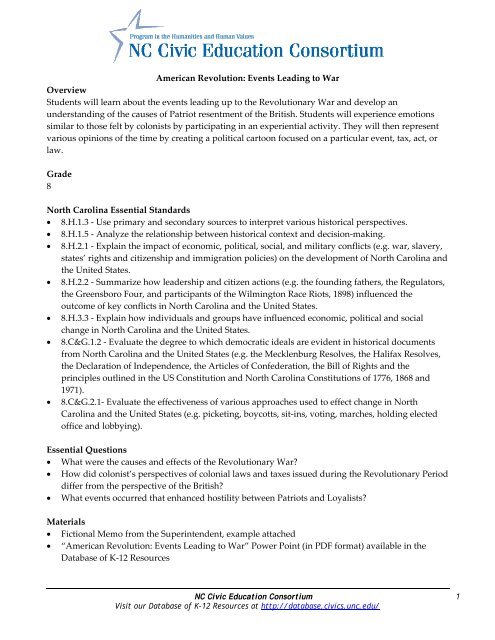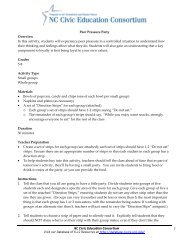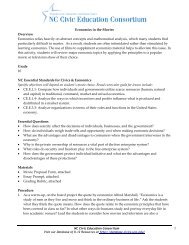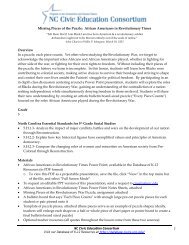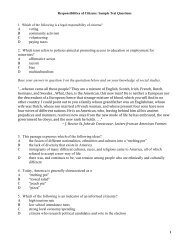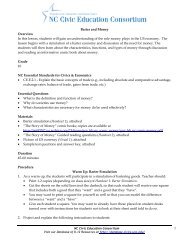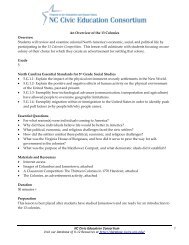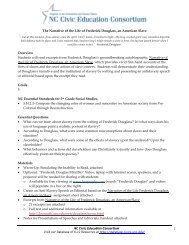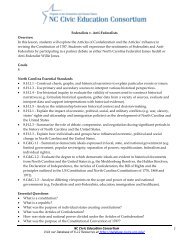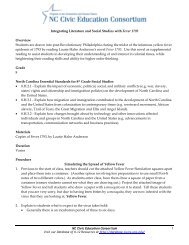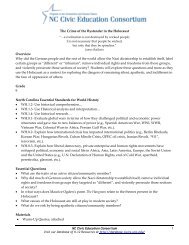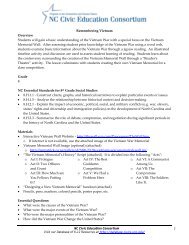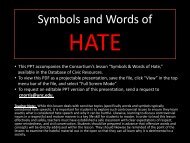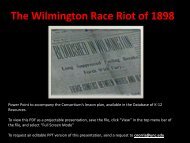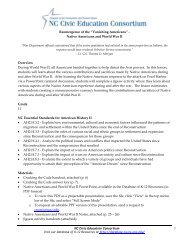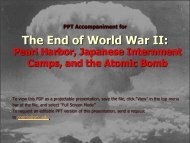American Revolution - Database of K-12 Resources
American Revolution - Database of K-12 Resources
American Revolution - Database of K-12 Resources
You also want an ePaper? Increase the reach of your titles
YUMPU automatically turns print PDFs into web optimized ePapers that Google loves.
<strong>American</strong> <strong>Revolution</strong>: Events Leading to War<br />
Overview<br />
Students will learn about the events leading up to the <strong>Revolution</strong>ary War and develop an<br />
understanding <strong>of</strong> the causes <strong>of</strong> Patriot resentment <strong>of</strong> the British. Students will experience emotions<br />
similar to those felt by colonists by participating in an experiential activity. They will then represent<br />
various opinions <strong>of</strong> the time by creating a political cartoon focused on a particular event, tax, act, or<br />
law.<br />
Grade<br />
8<br />
North Carolina Essential Standards<br />
• 8.H.1.3 ‐ Use primary and secondary sources to interpret various historical perspectives.<br />
• 8.H.1.5 ‐ Analyze the relationship between historical context and decision‐making.<br />
• 8.H.2.1 ‐ Explain the impact <strong>of</strong> economic, political, social, and military conflicts (e.g. war, slavery,<br />
states’ rights and citizenship and immigration policies) on the development <strong>of</strong> North Carolina and<br />
the United States.<br />
• 8.H.2.2 ‐ Summarize how leadership and citizen actions (e.g. the founding fathers, the Regulators,<br />
the Greensboro Four, and participants <strong>of</strong> the Wilmington Race Riots, 1898) influenced the<br />
outcome <strong>of</strong> key conflicts in North Carolina and the United States.<br />
• 8.H.3.3 ‐ Explain how individuals and groups have influenced economic, political and social<br />
change in North Carolina and the United States.<br />
• 8.C&G.1.2 ‐ Evaluate the degree to which democratic ideals are evident in historical documents<br />
from North Carolina and the United States (e.g. the Mecklenburg Resolves, the Halifax Resolves,<br />
the Declaration <strong>of</strong> Independence, the Articles <strong>of</strong> Confederation, the Bill <strong>of</strong> Rights and the<br />
principles outlined in the US Constitution and North Carolina Constitutions <strong>of</strong> 1776, 1868 and<br />
1971).<br />
• 8.C&G.2.1‐ Evaluate the effectiveness <strong>of</strong> various approaches used to effect change in North<br />
Carolina and the United States (e.g. picketing, boycotts, sit‐ins, voting, marches, holding elected<br />
<strong>of</strong>fice and lobbying).<br />
Essential Questions<br />
• What were the causes and effects <strong>of</strong> the <strong>Revolution</strong>ary War<br />
• How did colonist’s perspectives <strong>of</strong> colonial laws and taxes issued during the <strong>Revolution</strong>ary Period<br />
differ from the perspective <strong>of</strong> the British<br />
• What events occurred that enhanced hostility between Patriots and Loyalists<br />
Materials<br />
• Fictional Memo from the Superintendent, example attached<br />
• “<strong>American</strong> <strong>Revolution</strong>: Events Leading to War” Power Point (in PDF format) available in the<br />
<strong>Database</strong> <strong>of</strong> K‐<strong>12</strong> <strong>Resources</strong><br />
NC Civic Education Consortium 1<br />
Visit our <strong>Database</strong> <strong>of</strong> K-<strong>12</strong> <strong>Resources</strong> at http://database.civics.unc.edu/
o To view this PDF as a projectable presentation, save the file, click “View” in the top menu bar<br />
<strong>of</strong> the file, and select “Full Screen Mode”<br />
o To request an editable PPT version <strong>of</strong> this presentation, send a request to cnorris@unc.edu<br />
• America’s Growing <strong>Revolution</strong>ary Spirit, handout and answer key attached<br />
• <strong>Revolution</strong>ary War Political Cartoon examples, attached<br />
• <strong>Revolution</strong>ary Cartoons Assignment, attached<br />
Duration<br />
60‐90 minutes (split over two class periods)<br />
Procedures<br />
Day 1<br />
Experiencing Colonial Sentiment: Unfair Taxation<br />
1. As students enter the room, greet them at the door with a concerned look while handing them a<br />
memo from the school superintendent, stating that all students will have to pay a tax to use their<br />
lockers from today forward. Any students refusing to pay the tax will have to carry their items<br />
with them throughout the day (See the attached Memo from the Superintendent as an example.<br />
Teachers should create a similar document that will appear believable to students.) As students<br />
read they will likely be angered by this. Encourage discussion (the more you can get students<br />
riled up, the better) and chart their comments on the board. As you invite students to comment,<br />
also ask them to brainstorm ideas for changing this decision.<br />
‣ Teacher note: If students do not have lockers, choose another item or process to tax that is<br />
appropriate to your school day, such as carrying book bags or participating in PE or Art.<br />
2. Explain that the superintendent will waive the fee <strong>of</strong> the first students who volunteer to collect the<br />
locker tax and see if any students would like to submit their name. You may also go as far as<br />
asking students if any are ready to pay today, so that their locker use is secure for the rest <strong>of</strong> the<br />
month.<br />
3. Finally, explain to students that the memo is not real and have them reflect on their feelings<br />
through the process. You may ask questions such as:<br />
• How did you feel when you read the memo<br />
• Why did so many <strong>of</strong> you feel angry or cheated<br />
• Why was your response to this memo so passionate<br />
• How did you feel about the superintendent and why Is there anything he/she could have<br />
done to have made you accept this decision more readily<br />
• How did you feel about your classmates who volunteered to collect money or pay their tax<br />
today<br />
4. At this point, make it clear to students how their feelings throughout this activity were similar to<br />
the feelings <strong>of</strong> <strong>American</strong> colonists in the late 1700s, when colonists coined the phrase “no taxation<br />
without representation.” Briefly describe parallels such as the Navigation Acts <strong>of</strong> 1660 & 1663,<br />
the Sugar Act, the Stamp Act, and the Tea Act.<br />
Issues and Events Leading to the <strong>Revolution</strong>ary War<br />
NC Civic Education Consortium 2<br />
Visit our <strong>Database</strong> <strong>of</strong> K-<strong>12</strong> <strong>Resources</strong> at http://database.civics.unc.edu/
5. Explain to students that they will be learning about the many issues and events that caused major<br />
hostility between colonists and the British, culminating in the <strong>Revolution</strong>ary War. Either in<br />
partners or individually, handout the attached worksheet for students to complete (individually<br />
or in pairs), instructing them to use their text books, prior knowledge, and inferences to complete<br />
the answers.<br />
‣ Optional: Use the “Events Leading to the <strong>American</strong> <strong>Revolution</strong> Power Point” to disseminate<br />
background information and facilitate discussion regarding pre‐<strong>Revolution</strong> events, located in<br />
CEC’s <strong>Database</strong> <strong>of</strong> Civic <strong>Resources</strong>.<br />
6. Once students are finished, go over the correct answers (and/or take up their work for an<br />
assessment) and discuss:<br />
• If you were a colonist living in America in the late 1700s, which event, tax, act, or law would<br />
have angered you most and why<br />
• As you considered British perspectives and the colonist perspectives, what reoccurring themes<br />
did you notice<br />
• In what ways did colonists take civic action and express their feelings towards British rule and<br />
decisions (Discuss specific civic activity such as the Non‐Importation Association, boycotts,<br />
the Boston Tea Party, the Edenton Tea Party, etc.)<br />
• Imagine if Patriots had not acted on their displeasure. How might things have turned out<br />
different in America Why is civic participation important<br />
‣ Teacher note: Students will need to use their completed handout during the second part <strong>of</strong> the<br />
lesson. Thus, teachers should either collect the handouts or inform students that they will need to<br />
bring them to class tomorrow.<br />
Day 2<br />
Experiencing the Writs <strong>of</strong> Assistance<br />
7. This warm up requires a bit <strong>of</strong> acting skills on the teacher’s part, but should not take more than a<br />
few minutes to act out. As the class gets settled, the teacher should pretend to be very angry and<br />
inform students that at some point yesterday, your wallet was stolen out <strong>of</strong> your desk. Explain<br />
that you are disappointed, upset, and fairly certain it was someone in this exact classroom who<br />
did it. Ask students if they have any information and escalate your anger when students do not<br />
respond. Finally, tell them that you are all going into the hall, and each <strong>of</strong> them will open their<br />
lockers for you to search. Make them believe that you mean business. (If students do not have<br />
lockers, teachers can substitute the threat, such as tell students that all <strong>of</strong> their book bags will be<br />
searched.)<br />
8. Finally, let students know that you have made up this scenario. Have students reflect back on<br />
their feelings by asking how they felt about the idea <strong>of</strong> being forced to open their lockers/book<br />
bags for a search, even when they were innocent. As students debrief, explain that during colonial<br />
times, many merchants were constantly put in the same situation as British tax collectors<br />
presented writs <strong>of</strong> assistance (search warrants) to go through their businesses. This was another<br />
factor in causing <strong>American</strong> hostility towards the British.<br />
Creating Political Cartoons<br />
NC Civic Education Consortium 3<br />
Visit our <strong>Database</strong> <strong>of</strong> K-<strong>12</strong> <strong>Resources</strong> at http://database.civics.unc.edu/
9. Tell students that they will apply their knowledge <strong>of</strong> the causes <strong>of</strong> the <strong>Revolution</strong>ary War by<br />
creating a political cartoon based on a tax, law, or event from yesterday’s handout. It is important<br />
students know the difference between a regular cartoon and a political cartoon so that they do not<br />
create simple drawings; rather they create cartoons representing opinion, irony, commentary, etc.<br />
Make sure to discuss the definition and characteristics <strong>of</strong> political cartoons, and use examples to<br />
enforce this (see attached <strong>Revolution</strong>ary War Political Cartoons). As you project these examples, ask:<br />
• What do you see (Students should simply point out all symbols, characters, objects, text, etc.<br />
that they notice. Try to keep them from jumping to interpretation until all pieces <strong>of</strong> the cartoon<br />
are pointed out.)<br />
• What do you think What message is the artist trying to convey What do the symbols<br />
represent<br />
• What techniques has the artist used and why (exaggeration, caricatures, humor, sarcasm, etc.)<br />
• If you were an <strong>American</strong> Patriot, would you agree with the cartoonist Why<br />
• If you were a Loyalist, would you agree with the cartoonist Why<br />
10. Hand out the attached <strong>Revolution</strong>ary Cartoon Assignment Sheet and discuss your expectations.<br />
Encourage students to ask questions about the assignment. Remind them to create a political<br />
cartoon, and not a simple drawing. Let students know when their cartoon is due and that it will<br />
be shared with the class on that date.<br />
11. Upon completion <strong>of</strong> the cartoons, number and display the students’ work around the room and<br />
give them the opportunity to “tour” the classroom, interpreting the meaning behind each political<br />
cartoon.<br />
• Review class expectations before allowing students to travel around the room to viewed the<br />
displayed work (i.e. remind students to be respectful, positive, and safe as they move<br />
throughout the classroom.)<br />
• Instruct students to travel with notebook paper, noting the number <strong>of</strong> each cartoon they view<br />
and taking notes on what they see and like, and what their fellow student artist might be<br />
trying to convey.<br />
• Once students have viewed the cartoons, have the class participate in a feedback session and<br />
discussion <strong>of</strong> the various political cartoons. This will serve as a great way to review the causes<br />
<strong>of</strong> the <strong>Revolution</strong>ary War.<br />
‣ Alternative assignment: Another more simple option for a culminating assignment is to assign<br />
students a topic from the handout and have them create a headline poster. Finished posters<br />
should have four components:<br />
• a headline statement that summarizes the event (it should be catchy, short and does not just<br />
list the event)<br />
• summary <strong>of</strong> the event (at least 4 bullet points)<br />
• summary <strong>of</strong> how the colonists reacted to the event (at least 2 bullet points)<br />
• visual images‐the poster should be eye catchy, neat and have at least one visual<br />
Differentiation<br />
Students with special needs<br />
• Modify the reading and note taking by listing specific events or taxes on which the student should<br />
focus.<br />
NC Civic Education Consortium 4<br />
Visit our <strong>Database</strong> <strong>of</strong> K-<strong>12</strong> <strong>Resources</strong> at http://database.civics.unc.edu/
• Pair students with special needs with a reading/learning partner.<br />
• Modify the political cartoon as needed, assisting students with special needs in choosing the<br />
subject matter <strong>of</strong> his/her cartoon and discussing the opinion they want their political cartoon to<br />
represent.<br />
• Instead <strong>of</strong> the political cartoon, assign the poster activity described in step <strong>12</strong>.<br />
AIG Students<br />
• Instruct students to research political cartoons further and find current examples that reveal<br />
similar themes to the spirit felt during post‐<strong>Revolution</strong>ary America. Students can present these to<br />
class and describe their findings.<br />
NC Civic Education Consortium 5<br />
Visit our <strong>Database</strong> <strong>of</strong> K-<strong>12</strong> <strong>Resources</strong> at http://database.civics.unc.edu/
P U B L I C S C H O O L S O F N O R T H C A R O L I N A<br />
STATE BOARD OF EDUCATION<br />
DEPARTMENT OF PUBLIC INSTRUCITON<br />
301 North Wilmington Street, Raleigh, 27601<br />
To: All North Carolina Principals<br />
From: The Office <strong>of</strong> the State Superintendent<br />
Re: Taxation <strong>of</strong> student locker use<br />
Please note that effective , all North Carolina public school students will be<br />
taxed monthly for the use <strong>of</strong> their school locker. This tax is non‐negotiable, and any student<br />
refusing to pay the tax will loose their locker privileges.<br />
The funds collected will assist in the proposed renovation <strong>of</strong> the State Superintendent’s<br />
<strong>of</strong>fice, as well as the purchase <strong>of</strong> new <strong>of</strong>fice furniture for Board <strong>of</strong> Education employees<br />
working at 301 N. Wilmington Street in Raleigh. The tax will be $4.00 per month, a fee that<br />
we feel is quite reasonable.<br />
While we understand this may be a controversial issue, it is important all students and<br />
families recognize that we have no other choice due to recent budget cuts to our state<br />
education budget. We trust that every North Carolina student and family will do their part<br />
to assist in this matter.<br />
NC Civic Education Consortium 6<br />
Visit our <strong>Database</strong> <strong>of</strong> K-<strong>12</strong> <strong>Resources</strong> at http://database.civics.unc.edu/
<strong>Revolution</strong>ary War Political Cartoons Examples<br />
NC Civic Education Consortium 7<br />
Visit our <strong>Database</strong> <strong>of</strong> K-<strong>12</strong> <strong>Resources</strong> at http://database.civics.unc.edu/
Name: ________________________________________<br />
<strong>Revolution</strong>ary Cartoons Assignment<br />
Due date: ___________________________________<br />
Assignment:<br />
Create a political cartoon focused on an event, tax, act, or law that contributed to<br />
the outbreak <strong>of</strong> the <strong>Revolution</strong>ary War.<br />
Expectations<br />
Meets requirements <strong>of</strong> a political cartoon: contains opinion,<br />
commentary, satire, etc.<br />
Content:<br />
focuses on contributing factor <strong>of</strong> Rev. War<br />
Accuracy:<br />
shows a clear and correct understand <strong>of</strong> contributing factor represented<br />
Graphics:<br />
clarity, originality, and relevance to the assignment<br />
Creativity:<br />
color, original idea evident, overall attractiveness, etc.<br />
Points<br />
Possible<br />
Points<br />
Awarded<br />
----------------------------------------------------------------------------------------------------------------------------<br />
Name: ________________________________________<br />
<strong>Revolution</strong>ary Cartoons Assignment<br />
Due date: ___________________________________<br />
Assignment:<br />
Create a political cartoon focused on an event, tax, act, or law that contributed to<br />
the outbreak <strong>of</strong> the <strong>Revolution</strong>ary War.<br />
Expectations<br />
Meets requirements <strong>of</strong> a political cartoon: contains opinion,<br />
commentary, satire, etc.<br />
Content:<br />
focuses on contributing factor <strong>of</strong> Rev. War<br />
Accuracy:<br />
shows a clear and correct understand <strong>of</strong> contributing factor represented<br />
Graphics:<br />
clarity, originality, and relevance to the assignment<br />
Creativity:<br />
color, original idea evident, overall attractiveness, etc.<br />
Points<br />
Possible<br />
Points<br />
Awarded<br />
NC Civic Education Consortium 8<br />
Visit our <strong>Database</strong> <strong>of</strong> K-<strong>12</strong> <strong>Resources</strong> at http://database.civics.unc.edu/
Name: __________________________________<br />
America’s Growing <strong>Revolution</strong>ary Spirit<br />
Using your prior knowledge, your book, the internet, or any other resource in this room, research the following acts, events, and issues that contributed to<br />
the <strong>Revolution</strong>ary spirit <strong>of</strong> America. For each term:<br />
1. Define what it is.<br />
2. Infer how Patriots and Loyalists may have felt about the act, event, issue, etc.<br />
3. Sketch a small picture or symbol that represents the term and will help you remember its meaning.<br />
Tax or Event Definition How would Patriots have felt about this event Picture or Symbol<br />
How would Loyalists have felt about this event<br />
Writs <strong>of</strong> assistance<br />
Albany Plan <strong>of</strong> Union,<br />
1754<br />
Proclamation <strong>of</strong> 1763<br />
Sugar Act, 1764<br />
Quartering Act, 1765
Tax or Event Definition How would Patriots have felt about this event Picture or Symbol<br />
How would Loyalists have felt about this event<br />
Stamp Act, 1765<br />
Stamp Act Congress,<br />
1765<br />
Declaratory Act <strong>of</strong> 1766<br />
Sons <strong>of</strong> Liberty<br />
Non-Importation<br />
Association<br />
(1768)/boycotts
Tax or Event Definition How would Patriots have felt about this event Picture or Symbol<br />
How would Loyalists have felt about this event<br />
Boston Massacre, 1770<br />
Boston Tea Party, 1773<br />
Intolerable Acts, 1774<br />
Battles <strong>of</strong> Lexington and<br />
Concord, 1775 (“the shot<br />
heard round the world”)<br />
The Declaration <strong>of</strong><br />
Independence, 1776
America’s <strong>Revolution</strong>ary Spirit- ANSWER KEY<br />
*Answers will vary for Columns 2 and pictures/symbols will vary for Column 3<br />
Tax or Event Definition<br />
Writs <strong>of</strong> assistance A legal document that serves as a general search warrant to British <strong>of</strong>ficers. This document enabled <strong>of</strong>ficials to inspect not only<br />
shops and warehouses, but also private homes.<br />
Albany Plan <strong>of</strong> Union, A plan to place the British North <strong>American</strong> colonies under a more centralized government. The plan was adopted on July 10, 1754,<br />
1754<br />
by representatives from seven <strong>of</strong> the British North <strong>American</strong> colonies. Although never carried out, it was the first important plan to<br />
conceive <strong>of</strong> the colonies as a collective whole united under one government.<br />
Proclamation <strong>of</strong> 1763 This Proclamation was issued by King George III to organize Britain's new North <strong>American</strong> empire and to stabilize relations with<br />
Native North <strong>American</strong>s through regulation <strong>of</strong> trade, settlement, and land purchases on the western frontier. The Proclamation <strong>of</strong><br />
1763 forbade English colonists to live west <strong>of</strong> the Appalachian Mountains.<br />
Sugar Act, 1764 The Sugar Act set a tax on sugar and expanded the list <strong>of</strong> taxable items to include specified wines and cloth, c<strong>of</strong>fee, tropical foods<br />
and silk.<br />
Quartering Act, 1765 This act required the colonies to provide the basic needs <strong>of</strong> British soldiers- specified items included housing, cooking utensils,<br />
firewood and candles.<br />
Stamp Act, 1765 The Stamp Act <strong>of</strong> 1765 was a tax imposed by the British Parliament on the colonies that required them to pay a tax on every piece<br />
<strong>of</strong> printed paper they used (legal documents, licenses, ship’s papers, newspapers, etc.). The money collected by the Stamp Act was<br />
Stamp Act Congress,<br />
1765<br />
to be used to help pay the costs <strong>of</strong> defending and protecting the <strong>American</strong> frontier.<br />
The Stamp Act Congress convened in New York City on October 7 with nine colonies in attendance to discuss and act upon the<br />
Stamp Act. The delegates approved a 14-point Declaration <strong>of</strong> Rights and Grievances. The statement said that colonial taxation could<br />
only be carried out by their own assemblies, not Great Britain.<br />
Declaratory Act <strong>of</strong> 1766 This act <strong>of</strong> the Parliament <strong>of</strong> Great Britain was one in a series <strong>of</strong> resolutions passed attempting to regulate the behavior <strong>of</strong> the<br />
colonies. It stated that Parliament had the right to make laws for the colonies in all matters –including taxation.<br />
Sons <strong>of</strong> Liberty A secret organization <strong>of</strong> <strong>American</strong> colonists formed initially to protest the Stamp Act. Members <strong>of</strong> the group, including merchants,<br />
Non-Importation<br />
Association<br />
(1768)/boycotts<br />
businessmen, lawyers, journalists, and others, took on the motto "no taxation without representation."<br />
The Non-Importation Agreements were a series <strong>of</strong> commercial restrictions adopted by <strong>American</strong> colonists to protest British taxation.<br />
Merchants in New York, Boston and Philadelphia agreed collectively to boycott British imports until Parliament repealed the Stamp<br />
Act.<br />
Boston Massacre, 1770 During the Boston Massacre, five civilian colonists were killed by British soldiers. It was the culmination <strong>of</strong> civilian-military tensions<br />
that had been growing since royal troops first appeared in Massachusetts in October 1768 to enforce the heavy tax burden.<br />
Boston Tea Party, 1773 The Boston Tea Party was a direct action protest by colonists in Boston against the British government. On December 16, 1773, after<br />
<strong>of</strong>ficials in Boston refused to return three shiploads <strong>of</strong> taxed tea to Britain, a group <strong>of</strong> colonists boarded the ships and destroyed the<br />
tea by throwing it into Boston Harbor.
Intolerable Acts, 1774 “Intolerable Acts” was a popular name given by <strong>American</strong>s to four laws passed by the British Parliament in 1774 in response to the<br />
Boston Tea Party. The Intolerable Acts, also called Coercive Acts, were intended to punish the colony <strong>of</strong> Massachusetts for<br />
destroying tea that belonged to the East India Company and to show the other <strong>American</strong> colonies what might happen if they<br />
Battles <strong>of</strong> Lexington and<br />
Concord, 1775 (“the shot<br />
heard round the world”)<br />
disobeyed British policies.<br />
The Battles <strong>of</strong> Lexington and Concord were the first military engagements <strong>of</strong> the <strong>American</strong> <strong>Revolution</strong>ary War. They were fought on<br />
April 19, 1775, in Middlesex County, Massachusetts. The battles marked the outbreak <strong>of</strong> open armed conflict between Great Britain<br />
and the colonies.<br />
The Declaration <strong>of</strong><br />
Independence, 1776<br />
A statement, written primarily by Thomas Jefferson, that was adopted by the Continental Congress on July 4, 1776, which<br />
announced that the thirteen <strong>American</strong> colonies then at war with Great Britain were now independent states, and thus no longer a<br />
part <strong>of</strong> the British Empire


